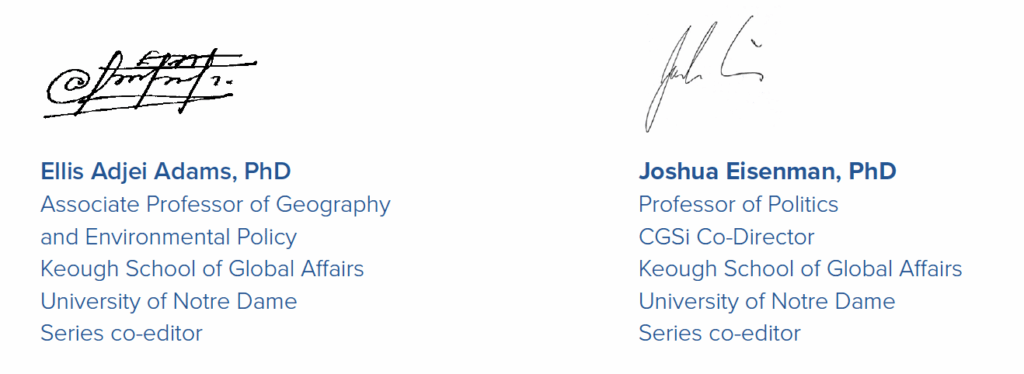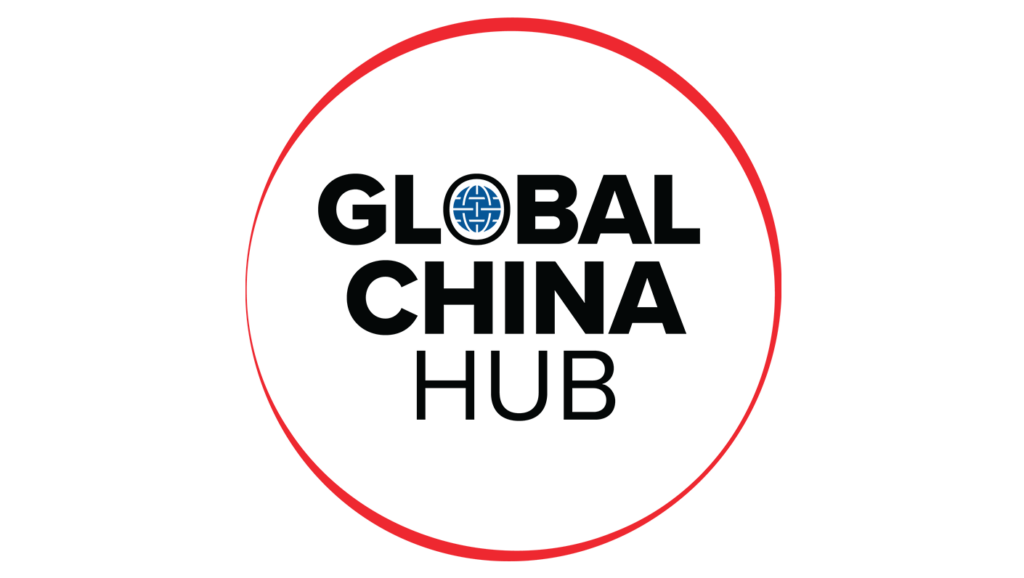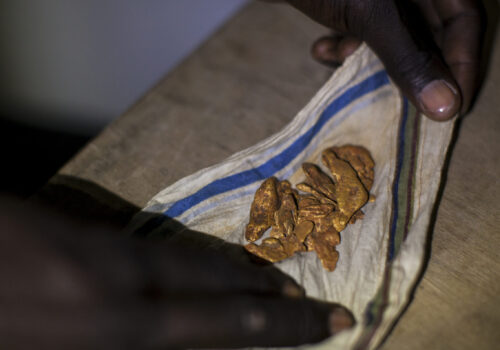Chinese fishing in West Africa: Responding to the environmental and social impacts
Editors’ introduction
In May 2025, the China Global South Initiative (CGSi), a collaboration between the Keough School of Global Affairs and the Atlantic Council Global China Hub, convened a group of twenty-two African environmental experts at the Peduase Valley Resort in Ghana for a three-day workshop on China’s environmental impact in West Africa. This policy workshop, hosted with the support of the Ford Foundation, included representatives from eleven West African countries—Benin, Burkina Faso, Cameroon, Cote d’Ivoire, Ghana, Liberia, Mali, Nigeria, Senegal, Sierra Leone, and Togo—and South Africa. Amid three days of comradery and collaboration, these experts worked together to draft policy memorandums on China’s environmental impact across the region. In the months following the workshop, we worked closely with the authors to curate three briefs—on mining and resource extraction, timber and wildlife, and fisheries and water resources—that identify the challenges and offer actionable policy solutions. We would like to recognize the excellent work of the co-authors who contributed their time and expertise to creating these briefs. In particular we would like to thank the group leaders Abosede Omowumi Babatunde, Ebagnerin Jérôme Tondoh, and Ebimboere Seiyafa and Awa Niang Fall, respectively, for their diligent work.
First and foremost, we would like to thank Caroline Costello, assistant director of the Atlantic Council’s Global China Hub, for her essential contributions to the workshop in Ghana and this collection of issue briefs. Her tireless efforts were truly essential to the success of the project. Ashley Bennett, events strategy program director of the University of Notre Dame’s Keough School of Global Affairs, provided critical logistical support across a dozen countries. Alexandra Towns at the Keough School and Cate Hansberry, Beverly Larson, and Jeff Fleischer at the Atlantic Council provided expert editorial support. Guidance from Notre Dame’s Pamoja Africa Initiative helped us identify contributors, and the Kellogg Institute helped support their participation. We would also like to thank the excellent staff of the Peduase Valley Resort for their hospitality during the May 2025 workshop. Last, but not least, we would like to thank our partner, the Ford Foundation, whose support made the workshop and these policy briefs possible. Ford is not responsible for the content of these policy briefs.

Bottom lines up front
- Chinese companies—including both state-backed firms and private actors—have rapidly expanded into West Africa’s fishing sector, often operating illegally in prohibited coastal waters.
- Chinese vessels employ bottom trawling and other destructive methods, which—combined with limited oversight and poor enforcement of national and transboundary laws—have caused declining fish stocks, weakened local fishery economies, and deteriorated coastal water quality.
- This brief examines the ecological and social risks posed by Chinese fishing in West Africa and offers policy recommendations to strengthen legal protections and enhance regional cooperation to safeguard the region’s fisheries and water systems.
Executive summary
Overfishing by Chinese trawlers poses a serious threat to West Africa’s rich fisheries and water resources, endangering regional food security, national economies, and local livelihoods. Chinese companies— including state-backed firms and private actors—have rapidly expanded into the region’s fishing sector, often operating illegally in prohibited coastal waters. Hundreds of Chinese vessels now fish off the West African coast, primarily between Senegal and Mauritania. These vessels are much larger than the artisanal canoes used by local fishermen and easily outcompete them. The expansion of Chinese companies’ fishery operations and overfishing in the region strains marine and freshwater ecosystems and undermines longstanding livelihoods of traditional fishing communities. Chinese vessels employ bottom trawling and other destructive methods, which—combined with limited oversight and poor enforcement of national and transboundary laws—have caused severe environmental degradation and declining fish stocks, weakened local economies, and deteriorated coastal water quality. At the same time, inland fish populations—especially in transboundary rivers such as the Falémé, Niger, and Volta—continue to decline due to runoff pollution from Chinese companies’ illegal mining operations. This policy brief examines the ecological and social risks posed by Chinese trawlers’ fishing in West Africa, and offers policy recommendations to strengthen legal protection and enhance regional cooperation to safeguard the region’s fisheries and water systems.
Background
Fisheries and aquaculture are vital to West Africa’s food security and economy—contributing more than 15 percent of regional gross domestic product (GDP), with Nigeria, Senegal, and Ghana accounting for 70 percent of total production.1“Comprehensive Strategic Framework for Sustainable Fisheries and Aquaculture Development (CSFS FAD),” ECOWAS Commission, Department of Agriculture, Environment and Natural Resources, and Directorate of Agriculture and Rural Development, October 2019, https://ecowap.ecowas.int/media/ecowap/file_document/2019_Regional_strategy_Fisheries__Aquaculture_CSFSFAD_EN.pdf; “The Future of Marine Fisheries in the African Blue Economy,” Africa Development Bank Group, May 4, 2022, https://www.afdb.org/en/documents/future-marine-fisheries-african-blue-economy. Fish are the main source of animal protein for more than 60 percent of households in the region, which produces 32 percent of Africa’s annual fish catch and 21 percent of its aquaculture in Africa.2“Africa Program for Fisheries,” World Bank, last visited August 25, 2025, https://www.worldbank.org/en/programs/africa-program-for-fisheries; “Fisheries and Aquaculture,” Regional Agency for Agriculture and Food, last visited August 25, 2025, https://www.araa.org/en/fisheries-and-aquaculture.
In recent decades, growing concerns have emerged among environmental experts, national policymakers, and coastal communities in West Africa about the environmental and socioeconomic effects of China’s expanding role in the region’s fisheries and water resources. Chinese firms’ involvement— driven by the depletion of domestic fish stocks—now extends throughout West African countries’ Exclusive Economic Zones (EEZs), major rivers, and shared transboundary watersheds.
Small-scale, artisanal local fishermen are no match for the larger, more powerful Chinese trawlers, which engage in both legal and illegal fishery activities, often exploiting weak local regulations, limited enforcement capacity, and the complicity of corrupt local actors.3“Is China’s Fishing Fleet Taking All of West Africa’s Fish?” BBC News, YouTube video, March 26, 2019, https://www.youtube.com/watch?v=nUClXFF2PKs; Edmund C. Merem, et al., “Analyzing the Tragedy of Illegal Fishing on the West African Coastal Region,” International Journal of Food Science and Nutrition Engineering 9, 1 (2019), 1–15, https://www.researchgate.net/publication/332327658_Analyzing_the_Tragedy_of_Illegal_Fishing_on_the_West_African_Coastal_Region. The lack of coordinated monitoring
and limited presence of enforcement agencies, such as coast guards or marine patrols, have enabled these fleets to operate with minimal oversight.4Ifesinachi Okafor-Yarwood, et al., “Survival of the Richest, Not the Fittest: How Attempts to Improve Governance Impact African Small-Scale Marine Fisheries,” Marine Policy 135 (2002), https://www.sciencedirect.com/science/article/pii/S0308597X21004589. China’s sizeable investments in industrial fishing—backed by state subsidies, low-interest loans, and tax exemptions—has resulted in growing instances of illegal, unreported, and unregulated (IUU) fishing in West Africa, ultimately undermining the long-term sustainability of the region’s fishery stocks.5Juan He, “From Distant-Water Fisher to Investor: Enhancing China’s State Responsibilities for Legal and Sustainable Fisheries in Coastal Africa,” Coastal Management 53, 1 (2025), 71–91, www.tandfonline.com/doi/full/10.1080/08920753.2025.2457308; Sam Geall, et al., “Charting a Blue Future for Cooperation between West Africa and China on Sustainable Fisheries,” Stimson Center, September 14, 2023, www.stimson.org/2023/charting-a-blue-future-for-cooperation-between-west-africa-and-china-on-sustainable-fisheries/.
Besides fishing, Chinese companies’ activities in mining, dredging, and infrastructure development compound pressures on water quality and aquatic ecosystems, with direct implications for fishery sustainability. Gold mining operations, particularly those involving mercury and cyanide, have contaminated rivers and their fish with harmful chemicals.6Richard Takyi, et al., “Socio-ecological Analysis of Artisanal Gold Mining in West Africa: A Case Study of Ghana,” Journal of Sustainable Mining 20, 3 (2021), 206–219, https://jsm.gig.eu/cgi/viewcontent.cgi?article=1322&context=journal-of-sustainable-mining. Bucket excavators used in mining operations deposit oils, fuels, and alluvium into riverbeds, which causes erosion, changes the shape of river channels, and damages ecosystems. Dredging also stirs up sediments, turning clear water murky. This increased cloudiness, known as high turbidity, makes water hazardous for drinking and affects aquatic ecosystems.7Ibid. The consequences of mine-related pollution extend to upstream catchments and transboundary river basins with socioeconomic and ecological importance, including the Tano-Bia Basin (Ghana and Côte d’Ivoire), the Falémé River (Senegal and Mali), and the Bagoé River (Côte d’Ivoire and Mali).8Noah Kyame Asare-Donkor and Anthony Apeke Adimado, “Influence of Mining Related Activities on Levels of Mercury in Water, Sediment and Fish from the Ankobra and Tano River Basins in South Western Ghana,” Environmental Systems Research 5, 1 (2016), 5, https://environmentalsystemsresearch.springeropen.com/articles/10.1186/s40068-016-0055-4; Mouhamadou Lamine Diallo, et al., “Gold Mining, Discourses, and Threats: What Is Really Damaging the Fluvial Hydrosystem of the Faleme River?” Journal of Political Ecology 32 (2024), https://journals.librarypublishing.arizona.edu/jpe/article/id/5949/; Augustin Kouame N’Guessan, et al., “Clandestine Gold Mining and Pollution Risks of Sediments from Bagoue River (Niger Watershed. Cote d’Ivoire),” International Journal of Fisheries and Aquatic Studies 9, 4 (2021), 149–158, https://www.researchgate.net/publication/354700049_International_Journal_of_Fisheries_and_Aquatic_Studies_2021_94_149-158_Clandestine_gold_mining_and_pollution_risks_of_sediments_from_Bagoue_river_Niger_watershed_Cote_d’Ivoire.
West African governments face structural obstacles in addressing Chinese vessels’ impact on fisheries and water resources, including under-resourced enforcement agencies and outdated legal frameworks that hinder effective regulation and governance. Corruption—particularly at the local level, where Chinese fishers sometimes pay communities not to report illegal fishing and mining—weakens oversight.9Torbjörn Wester, “‘They Are Stealing What Should Be Ours’: Chinese Trawlers Are Emptying West African Fishing Grounds,” Telegraph, June 5, 2023, https://www.telegraph.co.uk/global-health/climate-and-people/how-chinese-trawlers-are-emptying-westafrican-fishing-grou/; George Wright and Thomas Naadi, “Ghana Fishing: Abuse, Corruption and Death on Chinese Vessels,” BBC, January 3, 2023, https://www.bbc.com/news/world-africa-63720181. Political and business elites with vested interests in fishery ventures involving Chinese companies often obstruct reform or weaken enforcement. Moreover, the presence of non-state armed groups in key maritime zones, such as the Gulf of Guinea, hampers monitoring and leaves fisheries and waterways increasingly vulnerable to exploitation by Chinese trawlers.10Rossella Marangio, “Deep Waters: The Maritime Security Landscape in the Gulf of Guinea,” European Union Institute for Security Studies, January 9, 2025, https://www.iss.europa.eu/publications/briefs/deep-waters-maritime-security-landscape-gulf-guinea.
These governance challenges are further compounded by West African states’ dependence on loans from China’s state-owned banks and infrastructure projects, which have reduced their bargaining power and undermined their ability to hold Chinese companies accountable. Despite the existence of regional initiatives such as the Economic Community of West African States Agricultural Policy (ECOWAP) and the African Common Fisheries Policy, implementation has remained weak.11Aboubacar Sidibé, “Diagnostic on the Effectiveness of National Fishery and Aquaculture Policies and Strategies for Food and Nutrition Security in West Africa,” Food and Agriculture Organization of the United Nations, August 2020, https://openknowledge.fao.org/server/api/core/bitstreams/e250dc02-a76f-46ab-8521-36decdc49e76/content. Taken together, these impediments to enforcement leave marine and freshwater sectors neglected, allowing the associated environmental and social devastations to persist.
Evidence
China’s fishing fleet is currently considered the largest in West Africa, with nearly 17,000 vessels and annual catch amounting to roughly $3.8 billion.12Miren Gutiérrez et al., “China’s Distant-Water Fishing Fleet: Scale, Impact and Governance,” ODI, June 2020, https://media.odi.org/documents/chinesedistantwaterfishing_web.pdf. Mark Godfrey, “China’s Distant-Water Majors Stung by Poor Results despite Bullish Market Conditions,” SeafoodSource, December 22, 2021, https://www.seafoodsource.com/news/business-finance/chinasdistant-water-majors-stung-by-poor-results-despite-bullish-market-conditions. Chinese vessels benefit from state subsidies and advanced fishing technologies, enabling them to overwhelm local fisheries, leaving artisanal fishers unable to compete. In Ghana, local fishermen in wooden canoes have drowned after their small boats capsized in the wakes of large Chinese vessels.13Wester, “‘They Are Stealing What Should Be Ours.’”
Many Chinese fishing companies exploit poorly regulated licensing systems to conceal vessel ownership, engaging in joint partnerships with local actors, operating through local intermediaries, or registering as subsidiaries of local operators.14Kate Bartlett, “Fishy Business: Report Details Chinese Fleet’s Illegal Operations in West Africa,” VOA News, April 7, 2022, https://www.voanews.com/a/fishy-business-report-details-chinese-fleet-s-illegal-operations-in-west-africa-/6519387.html. Using local companies as legal fronts allows Chinese firms to circumvent fishing license laws that prevent foreign vessels from operating within national EEZs.15Andrew Jacobs, “Chinese Fleets Illegally Fish in West African Waters, Greenpeace Says,” New York Times, May 20, 2015, https://www.nytimes.com/2015/05/21/world/asia/china-west-africa-fishing-greenpeace.html; Lu Xinqing, “China’s Distant-Water Fishing and Its Impact in West Africa,” China Global South Project, June 21, 2021, https://chinaglobalsouth.com/analysis/chinas-distantwater-fishing-and-its-impact-in-west-africa; Robert Paarlberg, “West Africa’s Falling Fish Stocks: Illegal Chinese Trawlers, Climate Change and Artisanal Fishing Fleets to Blame,” Conversation, April 9, 2024, https://theconversation.com/west-africas-falling-fish-stocks-illegal-chinese-trawlers-climate-change-and-artisanal-fishing-fleets-to-blame-226819#:~:text=Chinese%20companies-%2C%20thinly%20disguised%20as,had%20a%20chance%20to%20reproduce. Meanwhile, local corruption and collusion between China’s fishing operations and local political elites further stifles law enforcement.
Chinese industrial vessels operating in West African waters often fish in prohibited zones and use illicit practices such as dynamite, illegal nets, and chemicals that harm marine life and pollute waters.16Wester, “‘They Are Stealing What Should Be Ours.’” The impacts of these destructive techniques on local coastal communities in West Africa are profound. In Nigeria, Senegal, and Ghana, which account for 70 percent of the region’s fish production, foreign vessels dominate the industry, undercutting local economies and ecosystems.17“The Future of Marine Fisheries in the African Blue Economy.”
Due to illegal fishing, small-scale fishers, many of them women working in fish processing and sales, face declining catches and rising unemployment.18Blamé Ekoue and Mamah Djiman Hairith, “Danger at Sea—West Africa’s Scourge of Foreign Fleets,” Africa in Fact, February 4, 2025, https://africainfact.com/danger-at-sea-west-africas-scourge-of-foreign-fleets. Illegal fishing has led to over 300,000 losses in artisanal and traditional fish related jobs in West Africa. In 2018, illegal fishing cost Nigeria an estimated $70 million.19“Nigeria Loses $70m to Illegal Fishing,” Nation, May 6, 2021, https://thenationonlineng.net/nigeria-loses-70m-to-illegal-fishing/#-google_vignette. In Ghana, Chinese firms’ fleets engage in saiko, a form of illegal fishing in which industrial trawlers deliberately catch and resell small, juvenile fish at sea.20Victor Owusu, Rosina Sheburah Essien, and Moses Adjei, “The Same Old Story: ‘Saiko’ Practices and Coastal Livelihoods in Ghana’s Small-Scale Fisheries,” Marine Policy 173 (2025), https://www.sciencedirect.com/science/article/abs/pii/S0308597X24005736. By catching undersized fish, they undermine the sustainability of fish populations in the region’s marine ecosystems. This illegal fishing practice threatens the livelihoods of coastal communities that rely on sustainable fishing for survival.21Lieven Engelen, “Under Cover of Darkness: The Damaging Effects of Illegal ‘Saiko’ Fishing,” Guardian, October 17, 2022, https://www.theguardian.com/environment/2022/oct/17/ghana-coastal-fishing-villages-industrial-trawling-saiko-illegal.
The abuse and neglect of local workers is common on Chinese fishing vessels. Interviews by the Environmental Justice Foundation found that 94 percent of Ghanaian crew members received inadequate medicine or witnessed verbal abuse.22Wright and Naadi, “Ghana Fishing.” One fisherman claims that he was treated like a “slave”: beaten, spit on, starved, forced to drink dirty water, and witnessed the deaths of three other African fishermen due to neglect and abuse.23Ibid. In Ghana and Senegal, local communities have reported labor violations and bribery involving local officials—practices that undermine local governance and strain relations between China and West African countries.24Ibid.
Industrial pollution is another major concern. Chinese vessels and processing plants routinely discharge harmful waste into both marine and inland waters. Pollution from Chinese-owned fishmeal factories has been reported in The Gambia, where the process contaminates inland waters, killing fish and precipitating the collapse of some local lagoons.25Fatou Hadim Jobe, “The Cycle of Inequity in Fishmeal Factories in The Gambia,” Ocean Nexus, 2025, https://oceannexus.org/2025/01/07/the-cycle-of-inequity-in-fishmeal-factories-in-the-gambia; “When Chinese Trawlers Plunder West African Water,” Maritime Crimes, July 7, 2023, https://maritimescrimes.com/2023/07/07/when-chinese-trawlers-plunder-west-african-waters; Ian Urbina, “The Factories Turning West Africa’s Fish into Powder,” BBC, March 23, 2021, https://www.bbc.com/future/article/20210323-the-factories-turning-west-africas-fish-into-powder. Gold mining operations, particularly those involving mercury and cyanide, are a public health menace, contaminating rivers and groundwater and threatening both fish and crops. Chinese companies dredging and mining operations have polluted and deformed the Falémé River in Senegal and Mali and the Bagoé River in Côte d’Ivoire and Mali, reducing the productivity of local fisheries and farmlands.26El Hadji Serigne Top, et al., “Gold Mining, Discourses, and Threats: What Is Really Damaging the Fluvial Hydrosystem of the Faleme River?” Journal of Political Ecology 32 (2024), 869–887, https://journals.librarypublishing.arizona.edu/jpe/article/5949/galley/6588/download/. China’s infrastructure development has further complicated water governance. The construction of the Lekki Deep Seaport in Lagos, for example, has severely disrupted local water and fishery ecosystems.27Ibrahim Adeyemi, “Cost of Development? How Lagos $1.5 Billion Seaport Altered Fortunes of Local Communities,” Premium
Times, June 18, 2023, https://rainforestjournalismfund.org/stories/cost-development-how-lagos-15-billion-seaport-altered-fortunes-local-communities.
Efforts by individual countries—such as Ghana’s Fisheries Commission and Nigeria’s new Ministry of Marine and Blue Economy—have been undermined by weak institutional capacity and limited financial investment.28Aboubacar Sidibé, “Diagnostic on the Effectiveness of National Fishery and Aquaculture Policies and Strategies for Food and Nutrition Security in West Africa,” Food and Agriculture Organization of the United Nations, August 2020, https://openknowledge.fao.org/server/api/core/bitstreams/e250dc02-a76f-46ab-8521-36decdc49e76/content. In Togo, understaffing and poor coordination among fisheries and water institutions undermine enforcement despite the country’s accession to the Port State Measures Agreement (PSMA) to combat illicit and unregulated fishing.29Kodjo N’Souvi, et al., “Fisheries and Aquaculture in Togo: Overview, Performance, Fisheries Policy, Challenges and Comparative Study with Ghana, Mali, Niger and Senegal Fisheries and Aquaculture,” Marine Policy 132 (2021), https://www.sciencedirect.com/science/article/abs/pii/S0308597X2100292X?via%3Dihub. The presence of armed groups in the Gulf of Guinea inhibits enforcement officers’ ability to conduct the surveillance and monitoring necessary to curb illegal activity and protect marine sovereignty.30Olusegun Paul Adesanya, “Maritime Crimes and the Gulf of Guinea,” Cogent Social Sciences 9 (2023), https://www.tandfonline.com/doi/full/10.1080/23311886.2023.2241263. These multilayered security challenges underscore the urgent need for national and regional policy interventions to improve oversight and safeguard the sustainability of fisheries and water resources by regulating Chinese fishers exploitation in the EEZs of West African countries.
Policy recommendations
Strengthen governance and legal frameworks
- Implement stricter penalties. Penalize local fishing companies that collaborate with Chinese trawlers to circumvent fishing license laws and other environmental policies. Fines, vessel confiscation, and blacklisting mechanisms should be introduced for companies and individuals acting as intermediaries to enable illegal fishing or the dumping of waste and pollutants into marine and freshwater systems.
- Revise outdated fisheries and water resource policies. Update policies and laws to reflect current realities including the rapid expansion of industrial-scale overfishing, invasive ballast discharge by foreign vessels, and plastic waste pollution. Policymakers should engage all relevant stakeholders—including small-scale fishers, processors, local nongovernmental organizations and local communities—to revise existing laws and policies. New laws should clearly outline regulatory loopholes and specify new monitoring and enforcement mechanisms to address them.
- Invest in the navy and the coast guard. To better monitor China’s illegal fishing activities along their coasts and EEZs, West African countries should invest in increasing the capacity—through better equipment and training—of their navy, coast guard, and other maritime security and enforcement agencies. Port authorities, coast guards, and inland water management units must be trained and incentivized to enforce existing environmental standards effectively and consistently.
- Work with the Sub-Regional Fisheries Commission (SRFC). The SRFC, based in Dakar, Senegal, should grow its policy influence in West Africa by coordinating closely with member states to develop regional policies and guidelines for dealing with overexploitation. The SRFC can become the regional hub for the harmonization of fishery laws, joint patrols, and shared resource management.
Improve regional monitoring and surveillance
- Develop a regional real-time monitoring system to track water resources, illegal activities, and waste dumping. The system should integrate satellite data, citizen reporting platforms, and automatic identification systems (AIS) to create a comprehensive monitoring web across the Gulf of Guinea and key river basins. AIS are positional awareness systems used to identify ships and provide additional information such as location, speed, intended port of call, prior identities, and activity history. They give authorities a full view of ships’ likely involvement in illegal fishing activity.31“AIS (Automatic Identification System) Overview,” NATO Media Centre, last visited August 20, 2025, https://shipping.nato.int/nsc/operations/news/2021/ais-automatic-identification-system-overview. Ghana has already employed AIS tools as part of its Vessel Viewer pilot program, and has seen success in strengthening its monitoring, control, and surveillance operations.32“Ghana Sees Major Improvements with Vessel Viewer,” Global Fishing Watch, December 3, 2024, https://globalfishingwatch.org/case-study/ghana-sees-major-improvements-with-vessel-viewer. AIS should be made mandatory for all industrial vessels operating in West African EEZs, with remote data made accessible to national and regional authorities.
- Develop public reporting systems. Growing public anger and grassroots activism have the potential to force governments to respond to these challenges, even if elites prefer the status quo. Highly publicized labor abuses, coupled with increasing resentment toward corrupt officials, exact a reputational toll. Civil society campaigns should seek to channel this anger into action, standing up platforms that allow citizens to anonymously report bad actors, including vessels, companies, complicit government officials, and intermediaries involved in illegal fishing or toxic waste disposal. This system should offer multiple online reporting options. This system should begin on the national level with an eye toward expanding to the regional level. By democratizing the response to this problem, civil society leaders can diversify oversight away from a small group of corrupt actors and elite gatekeepers. By demonstrating to officials that the desire for public monitoring is widespread, a successful reporting system will also be a mechanism for generating greater political will for change.
Promote sustainable fisheries agreements and mechanisms
- Empower the Economic Community of West African States (ECOWAS) to promote transboundary cooperation on shared waterways. Joint watershed management programs should be established to address shared pollution risks, dam regulation, and hydrological data sharing. This should begin with transboundary river systems such as the Volta Basin, the Falémé, and the Tano-Bia. ECOWAS could promote multilateral agreements and provide a multinational venue for promoting data sharing and enabling enforcement transboundary agreements. Working multilaterally can help override local elite resistance, as reform-minded officials can justify enforcement by citing binding regional commitments and reputational risks within ECOWAS.
- Negotiate regional fisheries agreements with China that prioritize the interests of coastal communities. Enforced under ECOWAS, these regional agreements should emphasize environmental sustainability, verifiable catch quotas, mandatory gear and equipment specifications, and designated no-fishing zones.
About the authors
Ellis Adjei Adams is an associate professor of geography and environmental policy at the Keough School of Global Affairs, University of Notre Dame. With background in both social and natural sciences, his research examines the social, political, institutional, and governance dimensions of environmental and natural resources, particularly water. He currently conducts research in Ghana, Malawi, Kenya, Uganda, and the United States.
Awa Niang Fall is full professor of physical geography at Cheikh Anta Diop University, in Dakar, Senegal. Since 2010 she has been involved in the African Networks of Centres of Excellence on Water Sciences Project, and leads the Master/UNESCO Chair on Integrated Management and Sustainable Development of West African coastal zone (Master GIDEL). Since June 2022 she has been coordinating the European Union-funded GoNEXUS project on behalf of UCAD, covering 6 river basins in Europe and Africa.
Kadidia Kane is a Malian civil servant working at the Mopti Regional Hydraulics Directorate. She holds a degree in hydrogeology engineering and a master’s degree in integrated water resources management. She currently serves as Head of the Water Resources Inventory and Management Division within this directorate, where she is involved in all activities related to water and related resource management.
Kodjo N’Souvi holds a master’s degree in economic analysis and policy and a doctorate in agricultural economics, majoring in fisheries economics and management. He is currently working as post-doctoral research associate at the College of Economics and Management, Shanghai Ocean University, China. His major area of research includes economics of aquaculture, namely shrimp, the socioeconomics of small-scale fisheries, sustainable fisheries, aquaculture development, and climate change.
Isa Olalekan Elegbede is a distinguished environmental assessment, planning, and sustainability expert focusing on marine sustainability and the blue economy. He is the Deputy Chair of IUCN/CEESP/TGER, Switzerland, and a Future Earth Coast (FEC) Fellow. Dr. Elegbede plays a key role in shaping policies for sustainable fisheries management and marine governance through his contributions to the Central and South Atlantic Regional Scientific Research Working Group and as a co-chair of the GEO BON Blue Planet Fisheries Working Group.
Ebimboere Seiyefa is a lecturer at Baze University in the department of international relations and diplomacy, with a background in politics, governance and security in West Africa. She has worked with Conflict Research Network West Africa, ACLED, NATO Southern Hub and USIP, amongst other institutions, to advance human security initiatives towards a peaceful West Africa.
Salamatu J. Tannor is a certified Mining HSE Professional with an interdisciplinary background in natural sciences. She is currently working as postdoctoral research associate at the Faculty of Life Sciences, Rhine-Waal University of Applied Sciences Kleve, Germany. Her research interests include the interactions of global economic systems such as mining and agribusinesses with other socio-ecological systems (people & water) within rural landscapes.
Related content
Explore the program

The Global China Hub tracks Beijing’s actions and their global impacts, assessing China’s rise from multiple angles and identifying emerging China policy challenges. The Hub leverages its network of China experts around the world to generate actionable recommendations for policymakers in Washington and beyond.
Image: A navy guard rests in front of the captured Chinese trawler Lian Run 27, anchored offshore in Freetown, Sierra Leone, on February 22, 2007. Photo via Reuters.


